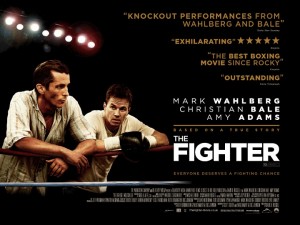film review: the fighter
Based on a true story, The Fighter is set in the working class town of Lowell, Massachusetts. Dickie (Christian Bale) was the town’s hero – a boxing champion who, after defeating Sugar Ray Leonard, descended into a crack addiction. When he’s not training his younger half brother Micky (Mark Wahlberg) he’s lazing around with his drug addicted friends. But the film is not about the washed up Dickie; it’s about Micky, whose life resembles the fictional film character Rocky. After finding a connection with the college dropout turned bartender, Shelly (Amy Adams) who has high hopes for his career, Micky manages to fight his way to the top to compete in the Welterweight Championship.
It’s not the most original story – various successful boxing films have been made over the years (Million Dollar Baby, Raging Bull, and of course, the Rocky movies), but this film has a different tone to those noted. While the fight scenes are quite explicit, it is nothing compared to the violent realism depicted in Scorsese’s Raging Bull, nor does the story have the emotional impact of Million Dollar Baby. But like these films it does have a stellar cast, and a slightly more uplifting tone, as there are some strong comedic elements that shine through. The mother and her seven daughters brilliantly portray the epitome of ‘white trash,’ and a primary theme in the film is the importance of family and brotherhood.
On the other hand however, the film is also an exploration into the effects of crack cocaine, and Christian Bale is convincing as always. His emaciated frame, distinguished cheekbones and balding head highlight the effects of substance abuse (and his appearance is reminiscent of his role as a prisoner of war in Werner Herzog’s Rescue Dawn). I must admit that while I’ve never been a big fan of Wahlberg (especially after his unflattering performance in The Other Guys), he did portray the protagonist in this film with ease.
The film contains some interesting cinematographic shots throughout. The boxing match footage is particularly memorable, and according to the filmmakers sections of footage were taken from Micky’s actual fights, along with real commentary from HBO’s Larry Merchant, Roy Jones Jr. and Jim Lampley. Beta cameras were also effectively used to create a sense of realism.
While the film is entertaining, there are some plot flaws – most notably the fact that Dickie’s ‘redemption’ is not very well developed, nor is Micky’s drastic transition from an amateur fighter to the Welterweight champion. Ironically however, right before the credits started to roll I was thinking to myself: what a typical Hollywood ending. And then the inter-title reminded me that this is in fact a true story.
Overlooking the plot holes, the film seems to maintain authenticity to the original boxing champion’s life story.



it is grate tiffany bolg. thanks